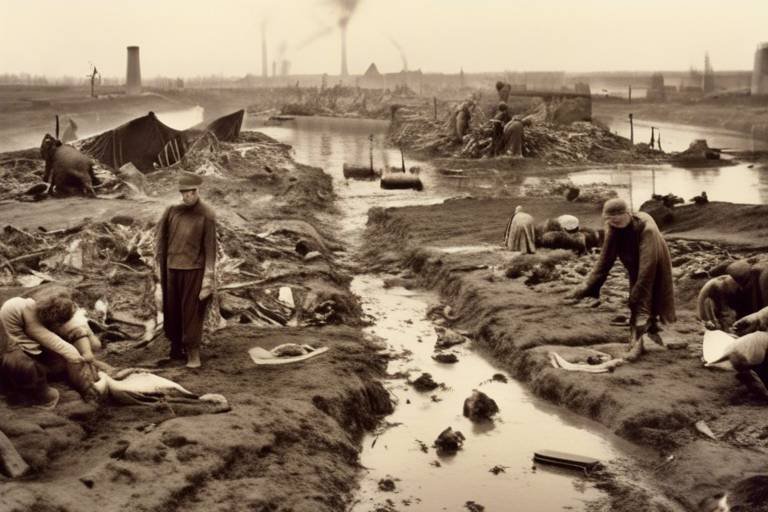The American Civil War - Battles and Their Significance
When delving into the tumultuous era of the American Civil War, one cannot overlook the pivotal role that various battles played in shaping the course of history. These battles were not merely clashes of arms, but rather seismic events that reverberated through time, leaving an indelible mark on the fabric of the nation. Each engagement, from the blood-soaked fields of Gettysburg to the strategic stronghold of Vicksburg, bore witness to the courage, sacrifice, and strategic acumen of those who fought on both sides of the conflict.
The Battle of Gettysburg stands as a testament to the ferocity and determination of both Union and Confederate forces. This monumental clash marked a turning point in the war, halting General Lee's audacious invasion of the North and dealing a decisive blow to the Confederate cause. The echoes of cannon fire and the cries of the fallen still resonate across the fields of Gettysburg, a stark reminder of the cost of freedom and the price of unity.
Similarly, the Battle of Antietam, with its staggering loss of life, stands as a grim testament to the horrors of war. Yet, it was on these blood-soaked fields that the course of history was altered, as Union forces repelled Lee's advance and paved the way for President Lincoln's Emancipation Proclamation. The sacrifices made at Antietam were not in vain, for they heralded a new dawn of freedom and equality for all Americans.
Turning our gaze towards the west, the Siege of Vicksburg emerges as a strategic masterpiece that altered the course of the war. The Union victory at Vicksburg not only secured control of the vital Mississippi River but also split the Confederacy in two, crippling its ability to wage war effectively. The siege of Vicksburg stands as a testament to the power of perseverance and the resilience of the human spirit in the face of adversity.
As we traverse the battle-scarred landscapes of Shiloh, Chancellorsville, Fredericksburg, and Fort Sumter, we are reminded of the human cost of war and the enduring legacy of those who fought and died on these hallowed grounds. Each engagement, whether a resounding victory or a bitter defeat, shaped the outcome of the conflict and set the stage for the reunification of a fractured nation.
Finally, the curtain falls on the final act of the Civil War at Appomattox Court House, where General Lee's surrender to General Grant marked the end of hostilities and the beginning of a new chapter in American history. The echoes of gunfire faded, replaced by the quiet rustle of olive branches as the nation sought to heal its wounds and forge a path towards a more perfect union.
As we reflect on these key battles and their significance, we are reminded of the enduring legacy of those who fought and died in the crucible of war. Their sacrifices, their courage, and their unwavering commitment to their cause serve as a beacon of hope and a reminder of the resilience of the American spirit in the face of adversity.

Battle of Gettysburg
Exploring key battles of the American Civil War and their historical significance in shaping the outcome of the conflict and the future of the United States.
The Battle of Gettysburg stands as a monumental turning point in the annals of American history. Picture this: the year is 1863, and the fate of the nation hangs in the balance as Union and Confederate forces clash in a fierce struggle for supremacy. General Robert E. Lee's audacious invasion of the North meets its match in the fields of Gettysburg, Pennsylvania. The battle rages on for three intense days, culminating in a Union victory that reverberates throughout the land.
Gettysburg marks the high-water mark of the Confederacy, where Lee's daring gamble ends in defeat, halting his advance and dealing a severe blow to Southern aspirations. The Union forces, under the leadership of General George Meade, emerge victorious, showcasing their resilience and determination. This pivotal moment not only ends Lee's Northern invasion but also boosts Union morale and sets the stage for future triumphs.
The significance of Gettysburg cannot be overstated. It not only turns the tide of the war in favor of the Union but also serves as a beacon of hope for a nation torn asunder by conflict. The fields of Gettysburg become hallowed ground, a solemn reminder of the sacrifices made and the price paid for the preservation of the Union.
1. What were the main causes of the American Civil War?
2. How did the Battle of Gettysburg impact the outcome of the conflict?
3. What role did key military leaders play in shaping the course of the war?
4. How did the Emancipation Proclamation influence the Civil War?

Battle of Antietam
The Battle of Antietam, also known as the Battle of Sharpsburg, took place on September 17, 1862, near Sharpsburg, Maryland. It was a pivotal moment in the American Civil War, marking the bloodiest single-day battle in the history of the United States. The conflict between Union General George McClellan and Confederate General Robert E. Lee resulted in over 23,000 casualties, with both sides suffering significant losses.
Antietam is significant not only for its staggering death toll but also for its strategic implications. The Union victory at Antietam halted Lee's advance into the North, preventing a Confederate invasion and boosting Northern morale. This pivotal moment led to President Abraham Lincoln's issuance of the Emancipation Proclamation, declaring the freedom of all slaves in Confederate-held territory.
The battle's aftermath highlighted the need for diplomatic intervention and paved the way for the Emancipation Proclamation, shifting the focus of the war towards the abolition of slavery. Antietam's impact reverberated throughout the nation, influencing public opinion and shaping the course of the Civil War.
Additionally, the Battle of Antietam underscored the brutal realities of war and the sacrifices made by soldiers on both sides. The battlefield's harrowing scenes and the staggering loss of life served as a somber reminder of the human cost of conflict, fueling debates and discussions about the war's purpose and ultimate goals.
Antietam stands as a testament to the resilience and determination of the Union forces, showcasing their ability to repel Confederate advances and secure crucial victories. The battle's historical significance lies not only in its immediate outcome but in its lasting impact on the trajectory of the Civil War and the future of the United States.
As the sun set over the blood-soaked fields of Antietam, the echoes of battle faded, leaving behind a legacy of courage, sacrifice, and the relentless pursuit of freedom. The Battle of Antietam remains etched in the annals of American history as a defining moment that shaped the nation's destiny and paved the way for a new chapter in the fight for liberty and equality.

Battle of Vicksburg
The Battle of Vicksburg was a pivotal moment in the American Civil War, shaping the course of the conflict and the future of the United States. This siege, lasting from May 18 to July 4, 1863, was a critical Union victory that had far-reaching consequences.
Located on the Mississippi River, Vicksburg was a crucial stronghold for the Confederacy, controlling access to the vital waterway. Union General Ulysses S. Grant recognized the strategic importance of capturing Vicksburg to gain control of the river and split the Confederacy in two.
The siege of Vicksburg was a prolonged and grueling campaign, with Union forces encircling the city and bombarding it from both land and water. The Confederate defenders, under General John C. Pemberton, held out for over six weeks, enduring intense shelling and dwindling supplies.
After multiple unsuccessful attempts to take the city by direct assault, Grant decided on a bold strategy. He launched a series of maneuvers to outflank the Confederate defenses, eventually forcing Pemberton to surrender on July 4, 1863.
The fall of Vicksburg was a significant turning point in the war. With control of the Mississippi River, the Union effectively cut off the western Confederate states from the rest of the Confederacy, severely hampering their ability to receive supplies and reinforcements.
Furthermore, the surrender of Vicksburg, coupled with the Union victory at Gettysburg just days later, dealt a severe blow to Confederate morale and momentum. These twin defeats marked a shift in the momentum of the war in favor of the Union.
In addition to its military significance, the capture of Vicksburg had profound political implications. President Abraham Lincoln famously remarked, "The Father of Waters again goes unvexed to the sea," highlighting the importance of regaining control of the Mississippi River for the Union cause.
The Battle of Vicksburg stands as a testament to the determination and strategic acumen of Union forces, showcasing their ability to overcome formidable obstacles and achieve decisive victories that would ultimately lead to the preservation of the United States as a single nation.

Battle of Shiloh
The Battle of Shiloh, also known as the Battle of Pittsburg Landing, took place on April 6-7, 1862, near the Tennessee River in southwestern Tennessee. This significant engagement was a brutal conflict that witnessed high casualties on both sides, with the Union and Confederate forces locked in a fierce struggle for control of key railway lines in the strategically important Western Theater of the war.
General Ulysses S. Grant, leading the Union forces, faced off against Confederate General Albert Sidney Johnston in a battle that would have far-reaching consequences for the course of the Civil War. Despite being surprised by the Confederate attack on the first day, Grant managed to rally his troops and hold his ground, setting the stage for a determined counterattack on the second day.
The Battle of Shiloh showcased the grim reality of war, with the landscape littered with the wounded and the dead. The intense fighting and heavy casualties served as a sobering reminder of the cost of conflict and the sacrifices made by those involved. The outcome of the battle ultimately secured Union control of the vital railway lines, bolstering their strategic position in the region.
One of the key outcomes of the Battle of Shiloh was the realization that the Civil War would be a long and bloody struggle, with neither side willing to back down easily. The fierce fighting and the determination displayed by both Union and Confederate forces highlighted the deep divisions that had torn the nation apart and the challenges that lay ahead in the quest for reunification.

Battle of Chancellorsville
The Battle of Chancellorsville holds a unique place in the history of the American Civil War, characterized by General Robert E. Lee's bold and daring tactics that resulted in a Confederate victory. This battle, fought in Virginia in May 1863, showcased Lee's military genius but came at a high cost with the loss of one of his most trusted commanders, General Stonewall Jackson. The death of Jackson, due to friendly fire, not only deeply impacted Lee but also had significant repercussions on subsequent battles.
Lee's decision to divide his forces and execute a risky flanking maneuver caught Union General Joseph Hooker off guard, leading to initial success for the Confederates. However, the death of Jackson, a brilliant strategist and leader, was a severe blow to the Confederate army. Jackson's absence affected the coordination and effectiveness of the Confederate forces in the later stages of the battle, despite their initial triumph.
The Battle of Chancellorsville highlighted the complexities and uncertainties of warfare, where even a seemingly advantageous position could turn into tragedy. It demonstrated the fine line between victory and defeat, showcasing the unpredictable nature of military conflicts. The loss of Jackson, known for his aggressive and effective tactics, left a void in Lee's command structure and impacted the overall Confederate strategy in subsequent engagements.
Despite the Confederate victory at Chancellorsville, the battle underscored the harsh realities of war, with casualties on both sides and the toll it took on soldiers and commanders alike. The death of Stonewall Jackson served as a poignant reminder of the human cost of conflict and the sacrifices made in the pursuit of military objectives.

Battle of Fredericksburg
The Battle of Fredericksburg was a crucial engagement during the American Civil War, highlighting the challenges faced by Union General Ambrose Burnside as he led his forces against Confederate troops under the command of General Robert E. Lee. Taking place from December 11 to December 15, 1862, near Fredericksburg, Virginia, this battle showcased the effectiveness of Confederate defensive positions along Marye's Heights. The Union forces suffered significant casualties due to the well-entrenched Confederate soldiers, who were positioned on high ground, making it difficult for the Union troops to advance.
General Burnside's strategy to attack the Confederate position head-on proved to be a costly mistake, as his troops faced devastating losses without making significant progress. The Union assaults on Marye's Heights were met with fierce resistance, leading to a high number of casualties among Union soldiers. The battle highlighted the importance of strategic positioning and defensive tactics in warfare, as the Confederates were able to repel repeated Union attacks with relative ease.
Furthermore, the Battle of Fredericksburg underscored the challenges faced by Union leadership in coordinating large-scale offensives and adapting to the changing dynamics of the battlefield. General Burnside's decision-making and tactical approach came under scrutiny following the defeat at Fredericksburg, leading to significant repercussions within the Union command structure.
In addition to its immediate military significance, the Battle of Fredericksburg influenced future military strategies and tactics employed by both the Union and Confederate forces. The lessons learned from this engagement, particularly regarding the importance of terrain and defensive positions, had a lasting impact on the conduct of warfare throughout the remainder of the Civil War.

Battle of Fort Sumter
The Battle of Fort Sumter holds a significant place in American history as the opening battle of the Civil War. Situated in South Carolina, Fort Sumter was a Union stronghold that found itself under siege by Confederate forces in April 1861. The relentless bombardment of the fort by the Confederates marked the beginning of a long and bloody conflict that would shape the future of the nation.
The battle at Fort Sumter was not just a military confrontation but a symbol of the deep divisions that had torn the country apart. The Union garrison, under the command of Major Robert Anderson, held out for several days against the Confederate assault, but the fort's surrender ultimately signaled the start of a brutal and protracted war that would claim countless lives on both sides.
The fall of Fort Sumter ignited a wave of patriotism and fervor on both sides, with volunteers flocking to join the Union and Confederate armies. The conflict that began at Fort Sumter would see brother fighting against brother, tearing families apart, and leaving scars that would last for generations.
As the first battle of the Civil War, Fort Sumter set the stage for years of bloody warfare and bitter struggle. It was a stark reminder of the high cost of division and the sacrifices that would be made in the pursuit of unity and freedom.

Battle of Appomattox Court House
The Battle of Appomattox Court House was the final engagement of the American Civil War, marking the end of the conflict that had torn the nation apart. It took place in early April 1865 in Appomattox County, Virginia. General Robert E. Lee, the commander of the Confederate Army of Northern Virginia, found his forces surrounded and outnumbered by Union troops under the command of General Ulysses S. Grant.
After a series of skirmishes and maneuvers, Lee realized the dire situation of his army and decided to surrender, effectively bringing an end to the Southern cause. The meeting between Lee and Grant took place in the parlor of the McLean House in the village of Appomattox Court House. The terms of surrender were generous, allowing Confederate soldiers to return home with their possessions and horses, recognizing the dignity of their service.
The surrender at Appomattox Court House symbolized the reunification of the United States and the beginning of the healing process after years of brutal conflict. It was a moment of both relief and sadness, as the nation mourned the staggering loss of life and destruction caused by the war. The event paved the way for the reconstruction era and the eventual reintegration of the Southern states into the Union.
Frequently Asked Questions
- What were the main causes of the American Civil War?
The main causes of the American Civil War were rooted in the issues of slavery, states' rights, and economic differences between the North and the South. The conflict ultimately stemmed from the long-standing debate over the expansion of slavery into new territories and states.
- How did the Battle of Gettysburg impact the outcome of the Civil War?
The Battle of Gettysburg was a significant turning point in the Civil War as it marked a major victory for the Union forces and ended General Lee's invasion of the North. The Confederate defeat at Gettysburg weakened their military capabilities and morale, shifting the momentum in favor of the Union.
- What was the significance of the Emancipation Proclamation during the Civil War?
The Emancipation Proclamation, issued by President Lincoln after the Battle of Antietam, declared the freedom of all enslaved individuals in Confederate-held territory. It transformed the Civil War into a fight for the abolition of slavery, altering the moral purpose of the Union cause and garnering international support.
- How did the Battle of Vicksburg impact the course of the Civil War?
The Siege of Vicksburg was a critical Union victory that gave them control of the Mississippi River, effectively cutting off Confederate supply lines and dividing the South. This strategic win at Vicksburg played a crucial role in the eventual defeat of the Confederacy.
- What role did General Stonewall Jackson play in the Battle of Chancellorsville?
General Stonewall Jackson played a key role in the Battle of Chancellorsville by executing bold and successful flanking maneuvers that led to a Confederate victory. However, Jackson was accidentally shot by his own troops during the battle, resulting in his untimely death and impacting the Confederate forces in subsequent engagements.



















